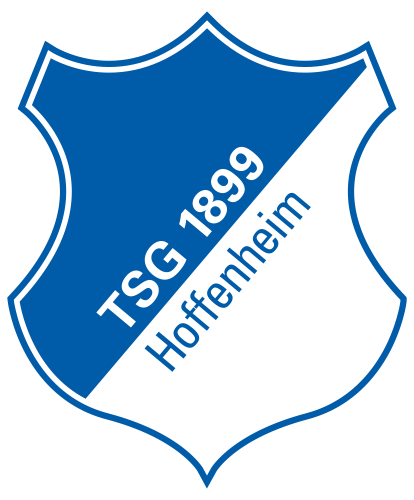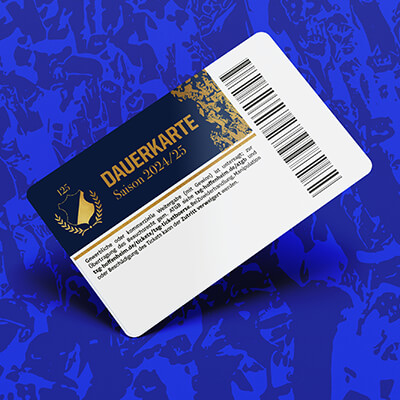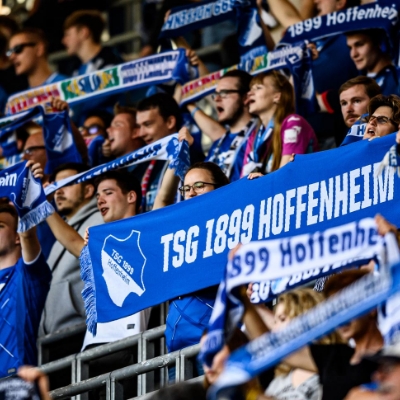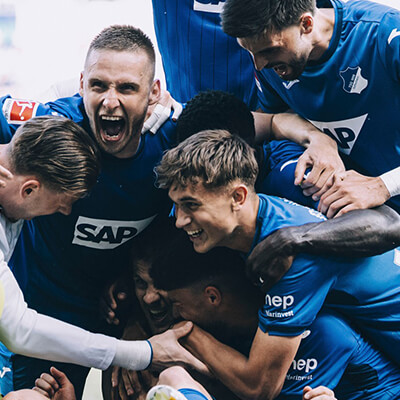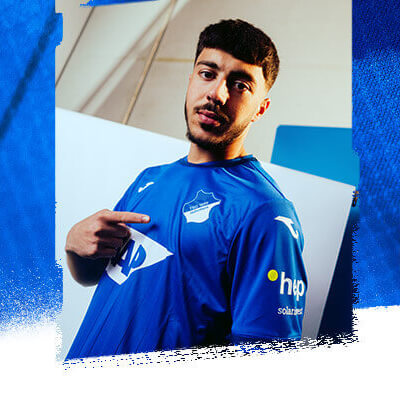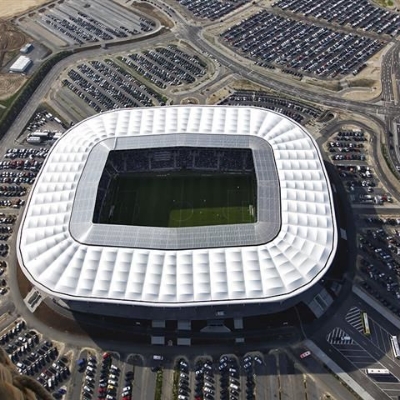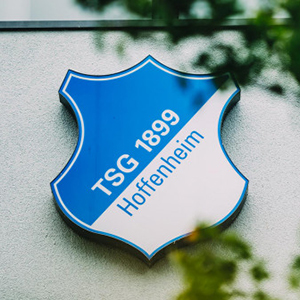Samassékou: "We're all equal here"
Diadie, following the death of George Floyd, who died due to police violence in the US, the anti-racism protests have reached a new level. People around the world have gathered to demonstrate against violence against black people. What did you think about the protests?
"They were great. We are in a very exciting phase at this time. We are all looking in the same direction. We want to put an end to racism. Both in football and in society. There is no room for racism. We come from different countries and have different skin colours, but we are all the same. The protests could make a lot happen. Many people are following the movement and joining the protests. That's a great development."
There were also protests in the Bundesliga. Several players made a show of support.
"I was very pleased with that. Fortunately, they were not punished by the DFL – they did everything right. People should follow them and emulate them. In addition, I thought the teams taking a knee before the matches was excellent. It shows the unity on the pitch. Racism has to be stopped. We all have to work in the same direction. People are now realising that it can no longer go on this way. This is a first step."
"No child is born racist."
Have you ever been racially abused?
"I have never been racially abused as a footballer. I don't know if I was just lucky or what it was. But no one in the world should be racially abused. It has to stop. No child is born racist. A lot is related to education."
Do you have friends or acquaintances who have already been insulted or even attacked?
"Fortunately not. Almost all my friends play in France. There are more dark-skinned people there and racism is not such a big problem. But of course I see it in the media. That makes me incredibly sad, of course. I really hope that it will end soon. The first step has now been taken. We have to build on that."
There are not only insults, but also other types of abuse: people are marginalised or ignored. What are your everyday life experiences in this respect?
"It's different in football than in normal life. It's all about your quality on the pitch. It doesn't matter if you're white or black. In normal life, it's a little different. If a black person and a white person with the same qualities apply for a job, the white person will almost always get the job. But it doesn't have to be that way. You just have to look at their abilities. Not where they are from. That's what people need to work on."
What do you think needs to be changed to reduce the problems?
"Football can be a role model for society. There are so many different nationalities on the pitch and this isn't an issue at all. Footballers are like brothers and have fun together. That's life – no matter where you come from. This is exactly what I feel at TSG. No one looks at your skin colour or origin. We're all equal here."
"I feel at home here."
You've been in Hoffenheim for almost a year. Do you feel comfortable in Kraichgau?
"I was really well received right away. I feel at home here, even though I haven't even been here for a year yet. I always try to do my best on the pitch and I want to repay their trust."
Your first season in the Bundesliga ended with 6th place in the league and qualification for the group phase of the UEFA Europa League. How do you rate your first season for TSG?
"In the beginning, of course, it was a little difficult. Due to the 2019 Africa Cup of Nations, I missed pre-season and linked up with the team a little later. Then I got hurt right at the start of the season and had to wait quite a long time for my debut in the starting eleven. But that's all behind me now. I'm confident I'll have a very good time here."
You talked about your injuries this season. How did you deal with the setbacks mentally?
"The first injury in particular (editor's note: thigh muscle injury) took a long time to get over, As it was the first time I was so injured that I was out for an extended period. But that happens in football. I worked hard to come back and I think I performed well. Unfortunately, I got injured again at the time of the restart after the Coronavirus break and missed a few weeks. But then I went full throttle and I'm right where I need to be now."
The last nine games were played without a crowd. What did you think about the games behind closed doors?
"It was a different feeling, especially at the beginning, but we got used to it after a few games. We wanted to make the fans happy with our victories on the TV and convey the emotions. I realised during the Coronavirus crisis what a privilege it is to play football. Before, I took it for granted, but we have seen that not everyone is allowed to do their job at the moment. We should all enjoy and appreciate that as long as we can."
You're playing in defensive midfield. With Florian Grilleitsch, Sebastian Rudy and Dennis Geiger, there was a lot of competition at TSG last season.
"I didn't play in my usual position at the beginning, but rather more as a box-to-box midfielder. But you always have to be ready to help the team, no matter where the manager puts you. I was always positive and have always given everything. Since the restart, I have played in defensive midfield. It went quite well, I think. I want to build on those performances and cement my place in the starting eleven."
Four match days before the end of the season, TSG and Alfred Schreuder parted ways.
"That came as a surprise to us as a team. I had a very good relationship with Alfred Schreuder, and I hold him in very high esteem as a person. He helped me in the first few weeks and months. It's the first time I've seen a manager go during a season. That's never easy, of course, but that's football.
"A great end to a very strange season.
With a new team of coaches, you qualified for Europe in the final sprint.
"It was, of course, a great end to a very strange season. For TSG, the third qualification for Europe in four years is a fantastic result. For me, the big goal was always to play in a European competition again. I am therefore happy that I will now get the opportunity to do so here.
You came to TSG from RB Salzburg before the season. How big is the difference between the Austrian and German league?
"The difference is huge. Every game in the Bundesliga is a challenge. No matter who you're playing against. You always have to give it your all. With Salzburg, 80 or 90 percent was sometimes enough to win a match. But here you have to give everything in every game. I had to get used to that too."
What was it like when you came to Austria from Mali?
"Of course, it wasn't so easy, especially at the beginning. I had to change and adapt. I was lucky enough to play at a club that gave me the time I needed. Of course, it was a completely different situation than before, but I gritted my teeth and got through it."
A few years earlier, you moved away from your family and joined a football academy. How was your time there?
"It was tough in the beginning. I left Faladie, a village in the capital, Bamako, for the first time when I went to the academy at the age of eleven. But I was still too young. That's why I returned home. But the JMG Academy – the best in Mali, which has produced some great players – definitely wanted me back. So I went back to the academy at age 14. Being separated from my parents and my four siblings was difficult for me. Over time, however, I realised I could do it. I always kept my goal of professional football in mind and fought hard for it."
"It was a very difficult time for us."
When the terrible civil war broke out in Mali in 2012, and hundreds of thousands of people fled, you were 16 years old. What were your experiences of the war?
"It was a very difficult time for us. When the war broke out, I was in the academy and couldn't see my family for several weeks. The academy was right next to an army base, so it was very dangerous for us. I had terrible nightmares at the time. I really hope that I don't have to experience anything like that again. You wouldn't wish that on anyone."
Your friends and family still live in Mali. What is the situation in your home country today?
"It's not as bad as it was a few years ago. My family lives in the capital, Bamako. The situation has calmed down there and they are relaxed. But the war is still going on in the smaller towns."
The Africa Cup of Nations will be held next year. What are your goals with the national team?
"Of course, we want to win the Africa Cup of Nations one day. I also think we have a very good and talented team. However, everyone knows that it is incredibly difficult to win the Africa Cup of Nations. African football is a little different than in Europe. We also want to qualify for the 2022 World Cup in Qatar."



